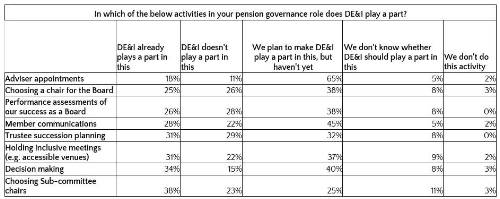New research from Barnett Waddingham reveals that while the majority of pension scheme trustees believe they are well-trained and informed on The Pension Regulator’s (TPR) Diversity, Equity, and Inclusion (DE&I) guidance, many continue to face significant challenges in implementing relevant processes as strategic priorities. The primary barrier identified is a lack of time, which hampers their ability to fully grasp industry best practices.
According to the research, which surveyed 65 member-nominated/employer-appointed pension board trustees, 65% said they had undergone a few sessions of DE&I training, with 17% participating in several sessions. 83% of trustees feel confident that they possess all the necessary knowledge about trusteeship, expressing no need for further training.
This certainty extends to their understanding of the regulator’s DE&I guidance, with trustees confident that both themselves (91%) and their boards (92%) fully understand TPR’s DE&I guidance for schemes.
But the research reveals a critical disconnect: almost half (45%) of the trustees admit that, despite having a DE&I strategy in place, it has no bearing on their trustee hiring processes. This is contrary to current TPR DE&I guidance. Furthermore, one in ten (11%) are still in the process of creating a DE&I strategy, 3% don’t yet have a strategy in place but plan to create one, and 2% (just one trustee) have no strategy or aspiration to create one.
Beyond hiring, trustees acknowledge that DE&I currently does not play a part in several key areas of their governance processes:

The widespread lack of DE&I integration raises concerns about the effectiveness of the DE&I practices among the 85% of schemes that claim to have such strategies in place.
Trustees are eager to understand industry governance best practices, but many find themselves constrained by time. A significant 71% of trustees stated they are too busy to research and learn about best practices, leading 77% to seek support from external advisors, such as the Pension and Executive Management Services team at Barnett Waddingham.
And while DE&I is a high priority for 42% of trustees, other strategic priorities for the next 12 months are demanding their attention, potentially diverting focus from successful DE&I implementation.
These priorities include:
• Strategy setting, including end game planning (43%)
• Adviser reviews and/or replacements (38%)
• TPR's New General Code, including Effective System of Governance (ESoG) & Own Risk Assessments (ORA) (34%)
Christine Kerr, Principal in Pension and Executive Management Services at Barnett Waddingham said : “It is encouraging to see that a majority of trustees feel confident in their understanding of DE&I guidance, but our findings highlight a critical gap between knowledge and implementation. Trustees must not only verbally commit to DE&I strategies, but also actively integrate these principles into their governance practices to foster truly inclusive and equitable pension schemes. This includes ensuring that DE&I considerations are embedded in trustee hiring, nomination, succession planning, and decision-making processes.
“Facilitated discussion sessions can be a great way to enable trustees to translate their understanding and beliefs on DE&I, providing a structured environment for trustees to address challenges, share best practices, while developing actionable plans that align with regulatory guidance.
“Also, to ensure clear and effective communications for members, it is vital for trustees to resolve DE&I integration issues. Our Barnett Waddingham teams are extensively equipped to help trustees navigate these challenges effectively, ensuring that DE&I initiatives are not only well understood but also successfully implemented.”
|

